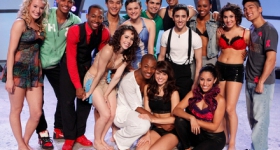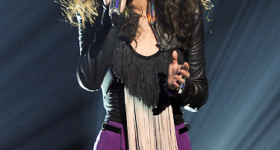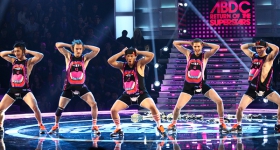Image courtesy of NBC
One of the biggest events this past week for us Filipino Americans was Friday night's episode of Grimm. If you grew up hearing tales of the Aswang -- a Filipino mythical creature that eats babies -- the Grimm episode, "Mommy Dearest," was likely one of the most terrifying things you've seen on prime time this season. It also probably brought you back to the days when your lola would sit you down and tell you all about the Mumu and Tiktik and Manananggal -- stories to put the fear in you and discourage you from being too curious.
You don't need me to even mention what a wonderful, validating thing it is to see a part of your childhood on television after being invisible for so long. It was also incredibly encouraging to read that the writers personally consulted Reggie Lee -- the actor who plays Sergeant Wu, the character around whom the episode was centered -- for ideas on a Filipino mythological creature. It was a great episode, one that did justice to how truly terrifying these stories were to us as children, and it was nice to see an actual Filipino American community on television.
It's still difficult to forget, however, that this is the third season of Grimm and this episode is the first time we even learn Sgt. Wu's first name. Obviously this isn't something we can dump on Reggie Lee. He has a very specific job to do as an actor, and he does it pretty well, but he's not a writer or creator.
On the same side of that coin, Mindy Kaling was at SXSW this week explaining why she disappoints everyone:
"'I'm a fucking Indian woman who has her own fucking network show," exclaimed an exasperated Mindy Kaling at the SXSW conference in Austin, Texas, when asked by a member of the 2,000-person crowd why there aren’t more women of colour on The Mindy Project.”
"No one asks any of these other shows that I adore — and I won’t name them because they’re my friends — why no leads on their show are women or women of color, but I’m the one who gets all of these things.
"It is a little insulting. I don't run the country, I’m not a political figure, I’m someone writing a show and I want to use funny people. What should I be doing? It’s a little frustrating to me.
"People have a higher expectation for me. They say, 'Why aren't you doing more?' The answer is: I always want to be doing more, because people should always be doing as much as they possibly can. But my full-time job is not a casting director of 'The Mindy Project,' my job is producer-writer-star."
I consider Mindy Kaling to be one of my personal career role models and I will ride with The Mindy Project until the bitter end, but I, too, have been disappointed with her lack of three-dimensional POC characters. She is just one of hundreds of creators of hundreds of shows that currently exist on television, and the burden of diversity can't and shouldn't be dumped on her. To be frank, it's a huge deal that she has her own show at all, and she's undoubtedly broken lots of barriers and paved the way for more women of color to do the same thing. But if we can't merely rely on more diverse creative teams to help us with more equal, more three-dimensional representation, who should we count on? Whose responsibility is it to bring more diversity to television?
UCLA’s Ralph J. Bunche Center for African American Studies recently conducted a comprehensive study on diversity in Hollywood with somewhat unsurprising results. Women and people of color are underrepresented in television and movies, which is old news to many of us. However, one interesting takeaway from the study is that TV shows with more diverse casts tend to have higher ratings.
A community effort is needed here, and the folks with actual greenlighting power (who are still overwhelmingly white and male) should lead efforts to support diversity in movies and television shows. The demand and the money are there, and it's now up to the studio and network executives to catch their content up to reality.
And as for Mindy, you are my television hero and massive amounts of respect for breaking down barriers and for the revolutionary work you've done in representing healthy body image on television -- but what's the harm in introducing a POC love interest, now that you've picked up a third season? I can totally see Daniel Henney, Sung Kang, Sendhil Ramamurthy, Laz Alonzo, and/or Gael Garcia Bernal being Dr. Lahiri's type...










Comments